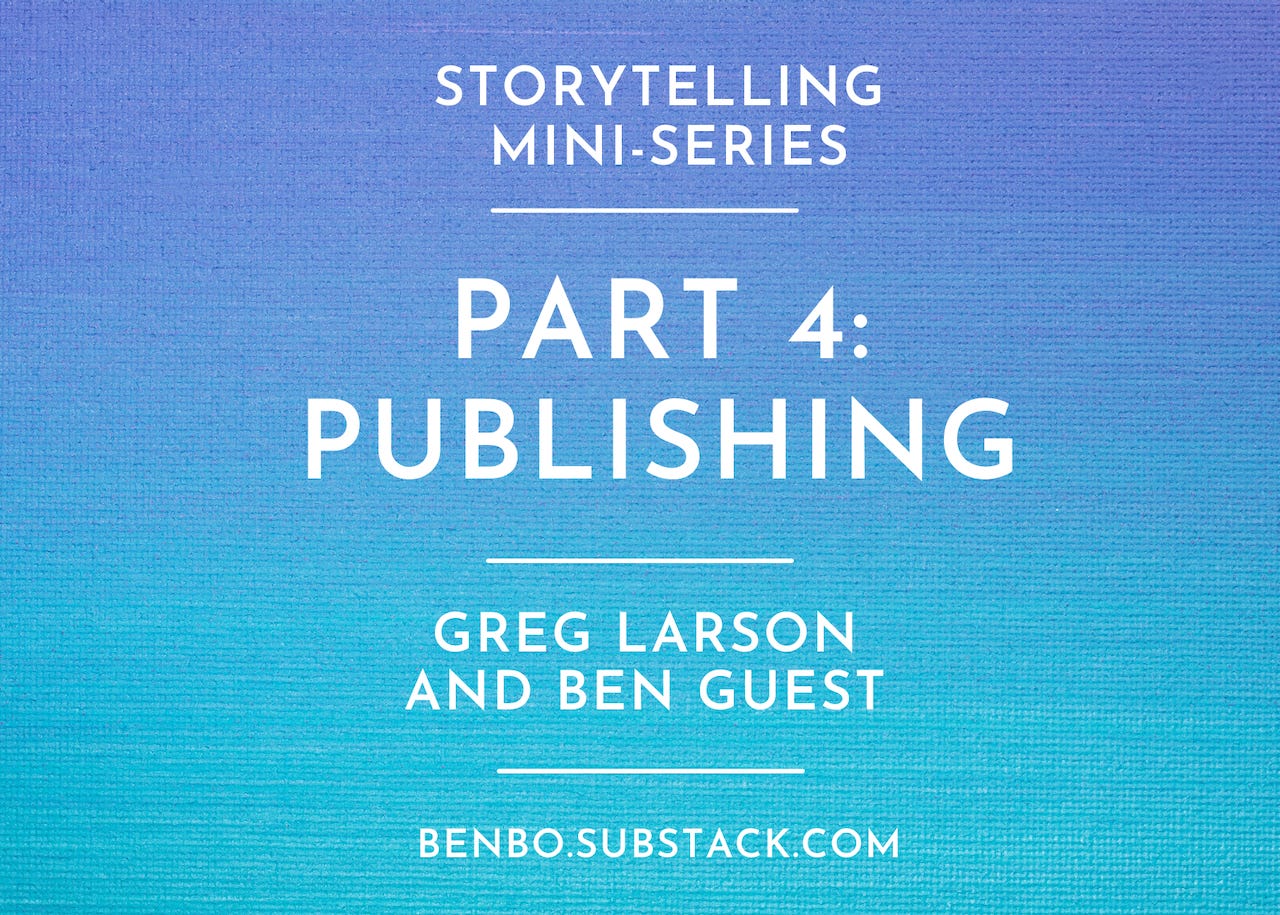A fifteen hundred advance and I get ten percent of net proceeds…
This is Part 4 of a Four-Part Miniseries on how to PLAN, WRITE, EDIT, and PUBLISH your creative work.
My co-host for the series is Greg Larson. Greg has written and edited more than 80 books.
In Part 1 we reviewed how to PLAN your book.
In Part 2 we reviewed how to WRITE your book.
In Part 3 we reviewed how to EDIT your book.
Today we’re going to review how to PUBLISH your book.
Specifically, Greg and I go into the differences, and benefits, of self-publishing versus traditional publishing.
TRANSCRIPT
Greg Larson:
The perception hasn't yet caught up with the reality, that's it? In the general public and in the traditional publishing.
Ben Guest:
Hi everyone. This is Ben Guest, and welcome to part four of my four part mini series on how to plan, write, edit, and publish your book. Today is episode four, publishing your book. And my co-host for this series is Greg Larson. Greg is the author and editor of more than 80 books. In this episode, we talk primarily the differences between traditional publishing and self-publishing. There's a lot more information I have to share on self-publishing, having self-published my own memoir, Zen and the Art of Coaching Basketball, and Greg traditionally published through the University of Nebraska Press, his memoir, Clubbie. We talk about both books in this interview. If you are interested in self-publishing, I can't recommend episode 34 enough, that self-publishing marketing and promoting your book with author Mark Paul, who has moved more than 40,000 of copies of his self-published book. So there's a ton of information in that episode. And in this episode, Greg and I break down the differences between traditional publishing and self-publishing. Enjoy.
Greg Larson:
Traditional publishing is just... Unless they transform their model to increase royalties and control to the individuals, it's just a model that's not going to work much longer. The problem at the core of all of this, is that from a readership standpoint, there is still this perception, maybe rightfully so, that a traditionally published book is going to be a better book than a self-pub. And that might be true by and large right now. But if you self-publish on Amazon, for example, you could get 75% of royalties, I think. And then Amazon's printing services just print on demand and just take 25% of the royalties for their part of it and you get 75%.
Ben Guest:
And you own your book.
Greg Larson:
And you own. Another problem is distribution. That self-publishing is... Those relationships are very real. So my publisher for Clubbie, University of Nebraska Press has relationships with Barnes & Noble or smaller publisher or smaller bookstores across the country. So that automatically, boom, before my book was even out, I had a thousand copies sold to these distribution outlets that are solely based on those relationships that the publisher has built. Now, would it be possible for an individual author to build similar relationships with distribution? Yeah, maybe, but then that's a lot of non-writing, non-promotion time. If you want to do all of the things that a traditional publishing house does, you're eventually going to have to become your own publisher. And in some ways that's the case, like building a relationship with your own copy editor, building a relationship with your own cover designer and person who does interior layout.
Greg Larson:
Ideally, that would be the same person. But I look at my rights and my contract, it's a $1,500 advance on the cloth bound, the hard cover, which is the only one that exists right now in physical form. I get 10% of net proceeds from sales on the first 3000 copies sold, and we sold 1500. And then I get 12 and a half percent on the net proceed for the next 2015, so I would max out at 15% royalties, net royalties. So my first royalty check came in. This is based off of a sales period where I had about 1500 sales. Right. $818 for 1500 copies sold. Now that's less the $1,500 signing advance. So approximately $2,300, it's a dollar and 50 cents per copy, something like that, is what I get paid.
Ben Guest:
There has been a ton of great promotion around Clubbie. Every single piece of promotion I've seen, you did yourself.
Greg Larson:
Yes, it's truly shocking. I was busting my ass all summer. I didn't expect any help from my publisher, and they lived up to that expectation, marketing-wise, if I said, "Hey, this person wants a review copy sent, could you send it to them?" They were quick on that turnaround time, but I got no indication that they cared one way or the other. And I was expecting that going into it. But yeah, dude, I was busting my ass getting into Forbes, LA Times, all these really big publications and got pretty unbelievable blurbs that did move the needle for me, but it was all me.
Ben Guest:
Right. And if we just do the math, so 1500 copies, that worked out, basically, between the advance and the royalties, let's say, 2300, 2400, somewhere around there.
Greg Larson:
Yep.
Ben Guest:
Okay. Let's say you sell 800 copies self-published on Amazon and you sell it for $7, right? You're going to take, I think it's 70%. You keep 70% of the royalties, seven times 800 times 0.7.
Greg Larson:
So that would be closer to $4,000.
Ben Guest:
So if you sold 800 books yourself, which you've done all the promotion, you wouldn't pocketed $4,000. Now there is a press has chosen you. Right. University of Nebraska Press can publish any fucken book. There's a million books out there. They've chosen you, so in the future, you are a published author that a publishing house has selected. At the same time, I was talking to my dad about this because my dad is in his early eighties. And so to people of his generation and the generation after him, how Mifflin publishing your book or whoever, Simon & Schuster publishing your book, that means something. But I said, "Dad, when's the last time you opened a book and looked at who published it?" No one even knows who's publishing books anymore.
Greg Larson:
Okay. I agree for the most part, but there are two things I would content. Those getting a contract from a big five or big six publisher is a far cry from getting a contract from a small press or a university press. That difference is true and real as far as design goes and as far as all of that goes. I would take a contract from a big five publisher. And then two, you're right, nobody looks at who the publisher is and says, "Oh, I'm not going to read that because it's some made up thing." But it's very likely that you would never have the opportunity to dismiss a self-published book, because it would never be in front of your face to be able to dismiss in the first place. Whereas, if I pull a book off the bookshelf at the bookstore, like I got to assume an older person would, they're not going to have a self-published book on the bookshelf in the first place.
Ben Guest:
Yeah. Hundred percent. And also to finish doing the math, we said the two non-negotiables in the editing episode, the two non-negotiables are a good copy edit, good cover design that might end up being around $5,000. So if you got to pay for that out of pocket, self-publishing, that $8,000 you just earned is now down to 3000 versus the 2300, we just kind of spitball.
Greg Larson:
Yeah. That's a benefit of the self-publishing process, is that you would have complete control over that. And you could pick whoever you want who has availability. You have to put the costs up front, but to me that would be worth it. Odds are, I'm going to self-publish my next book. I'm glad I went the traditional publishing route my first book and now shift. And now it's like, "Okay, I've been knighted by the traditional publishing world to a certain extent." I don't think I would've gotten that media attention if I were Greg Larson Press or whatever imprint I would make up. I don't think I would've gotten those media pieces. And now I have to ask myself, "Okay, the equation of, oh, getting in the LA Times, sold me 30 copies." I have no idea. I take that away if I'm self-published. But what I'm really taking away is proceeds of $45 for better royalties and less media attention.
Ben Guest:
With the media attention, I'm definitely going to give you a call when I'm a couple weeks out from self-publishing my coaching memoir. And just kind of put together the Greg Larson playbook. And then we can kind of see, okay, if you're self-publishing and doing some facts, similarly of the things that Greg did on his own, how much attention can you garner without a press behind you?
Greg Larson:
Yes. I think you'd be able to get my hypothesis that you could get decent amount of local media, like your hometown, that kind of stuff, like local newspapers, but the national media, I still haven't been able to test that hypothesis yet. But will gladly walk through. I've got a course for it, media pitch mastery course with Self-Publishing Sherpa, will gladly walk you through that process that I'm going to walk Ben through when the time comes.
Ben Guest:
Nice. Now I hope I don't die on Everest. Did you with Clubbie... I think I know the answer to this, but did you write the book and then shop it around or did you do a proposal and a query letter and all that stuff?
Greg Larson:
I did both. I was shopping it around when I was writing it, but I had no idea what I was doing. I mean, I was sending query letters and I start off by sending query letters and then people would ask me for a proposal and I was just like, "Oh, I don't have a proposal. I've barely even written it." And then I finished the manuscript and I was sending query letters just because it was a memoir and I was chopping it like a novel and that didn't hit. And then I wrote a proposal, but the work of the proposal, like the sample chapters and the proposal were already done and a lot of that [crosstalk 00:09:23].
Ben Guest:
Right. And that's how you then ultimately connected with University of Nebraska with the proposal?
Greg Larson:
Yeah. There were a couple of university presses that were interested and I went with Nebraska just because I liked their baseball catalog.
Ben Guest:
Nice. And what is the world of university presses?
Greg Larson:
It's basically like a small press. It feels like it's halfway between a small press publisher, like Graywolf or... I don't know, any other small presses, Solaris. Who the fuck knows what any of their names are? But these small presses with the small catalog and a small team, it's halfway between that and a bigger publishing house, like a university... I don't know how to describe it, man. They seem like they have more history. They have a catalog that goes back farther than a newer press.
Ben Guest:
Was it just a cold email or cold call that you gave University of Nebraska or what?
Greg Larson:
Yeah. I sent them an email. The sports editor, I had queried him before I'd even written the book. And he said, "How is this any different than other sports books? Like Pat Jordan's baseball memoir was." He's like, "How is this any different?" And I was like, "Well, it's different because of this." He never responded. I queried him again, never responded. Then, I think, the third time I queried him, I had a proposal and he called me up and was like, "Yeah, I'm very interested. I'm going to bring it to the editorial board. But I think they'll be very interested." I had that phone call with him in September, of 2019. And then my book published April, of 2021.
Ben Guest:
Right. That's the other thing, right?
Greg Larson:
Yes. Now granted part of that was because we are the lining up with baseball season. He's like, "Look, I'd like to publish it in 2020 spring season, but it's a little too late for that. So we'll do 2021." Thank God, because it just happened to coincide with a lot of changes in the minor league system that happened to be going on this summer as my book came out. So the timing was serendipitous.
Ben Guest:
Last question. So if I put myself on the couch here, I'm working with this retired MBA player on this autobiography, an established author who says traditional publishing's the way to go, stop writing, do a proposal, shop that proposal. What's your advice?
Greg Larson:
Proposal doesn't hurt.
Ben Guest:
And my recommendation was, we self-publish it. Now having talked to this established author, he's like, "Don't self-publish, traditionally publish it, shop it around."
Greg Larson:
And you would get paid to write the proposal?
Ben Guest:
Yeah. If we're going to do that, for sure. I'm not going to write it for free.
Greg Larson:
Right, right, right. My advice would be to both of you. Right. To you I would say, tell him that the odds are very good, that he's going to waste money hiring you. Set that expectation that, [crosstalk 00:12:00] I will write the proposal for you. The odds are very good that you're going to waste money doing that, but I will gladly do. But with him, it's like, if you really think that it's a worthwhile thing to do, let's go all in. Why not? Because maybe we're wrong. And maybe you find out that there is a really good contract for him. Now, granted getting in a large advance, for example, isn't always a good thing because if you don't earn out your advance, it's really hard to get the next book deal. Maybe he doesn't want to do another book deal. Who knows? But if he's even thinking about doing a traditional, it's his book, let him go that route. You've guided him.
Ben Guest:
Right. Right. But my advice to him is going to be, nah, if you do that, they're going to own the book. It's not going to be published for two years. And, let's say, on our own we sell what? 3000 copies at whatever, $10 a copy, you're going to take home 24,000.
Greg Larson:
Right.
Ben Guest:
Is an advance going to generate that much money? Probably not.
Greg Larson:
No.
Ben Guest:
Publish it on our own and then you own it and you collect 70% of the royalties. That's the end of my four part mini series on how to plan, write, edit, and publish your book. There's still much more to say, especially about self-publishing and marketing, which is the key, once you publish your book. So future episodes and future issues of my email newsletter will go into more depth on both of those aspects, self-publishing and marketing. You can subscribe to my newsletter at benbo.substack.com. That's benbo.substack.com. Benbo is a family nickname, B-E-N-B-O .subt.com. There, I have weekly podcast interviews just like this one. And I occasionally send out a newsletter post where I go into more detail about writing and self-publishing. So again, you can subscribe totally free at benbo.substack.com. Have a great day.












